Since 1983 Maine Maritime Academy has trained mariners for tug and barge operations. Admiral Edward Anthony “Ted” Rodgers, Superintendent of Maine Maritime Academy from 1964 through 1984, led the effort to develop the course. Tug and barge operating companies urged Rodgers to develop the course because Jones Act cargoes were moving to barge companies and away from smaller coastal vessels. Rodgers understood and supported changing the nautical program to include tug and barge operations. His actions to provide tug and barge training would be the first ever offered at a maritime academy. A search was then organized to find the right vessel and instructor for the historic addition of brown water training to blue water training.
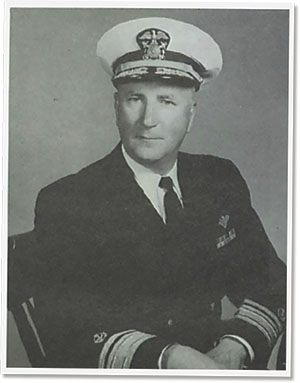
Admiral Edward Anthony “Ted” Rodgers
The first challenge was to find a tug that could pass Coast Guard vessel inspection rules and meet the requirements for a training vessel. Multiple tugs were available, but none could pass inspection. After an extensive search, a Coast Guard-inspected tug was found and purchased. It was the Jekyll Isle, a tug built in 1980 by Gladding and Hearn in Summerset, Massachusetts, owned and operated by Captain Charles Dana Gibson. The Jekyll Isle’s home port was Tampa Bay, Florida. In 1983, arrangements were made for captains Jerry Cummings and Tim Leach to bring the vessel to its new home at MMA. The twin screw, kort nozzle, 1,200 hp tug, was nearly new with only 1,700 hours on the main engines. MMA renamed the tug Pentagoet after the original fort and settlement in Castine. Forty years later, the Pentagoet is still in service as an MMA training vessel for a variety of courses, including ship handling, workboat operations, and tug and barge operations. The Pentagoet has proven to be the absolute perfect size and power for this training.
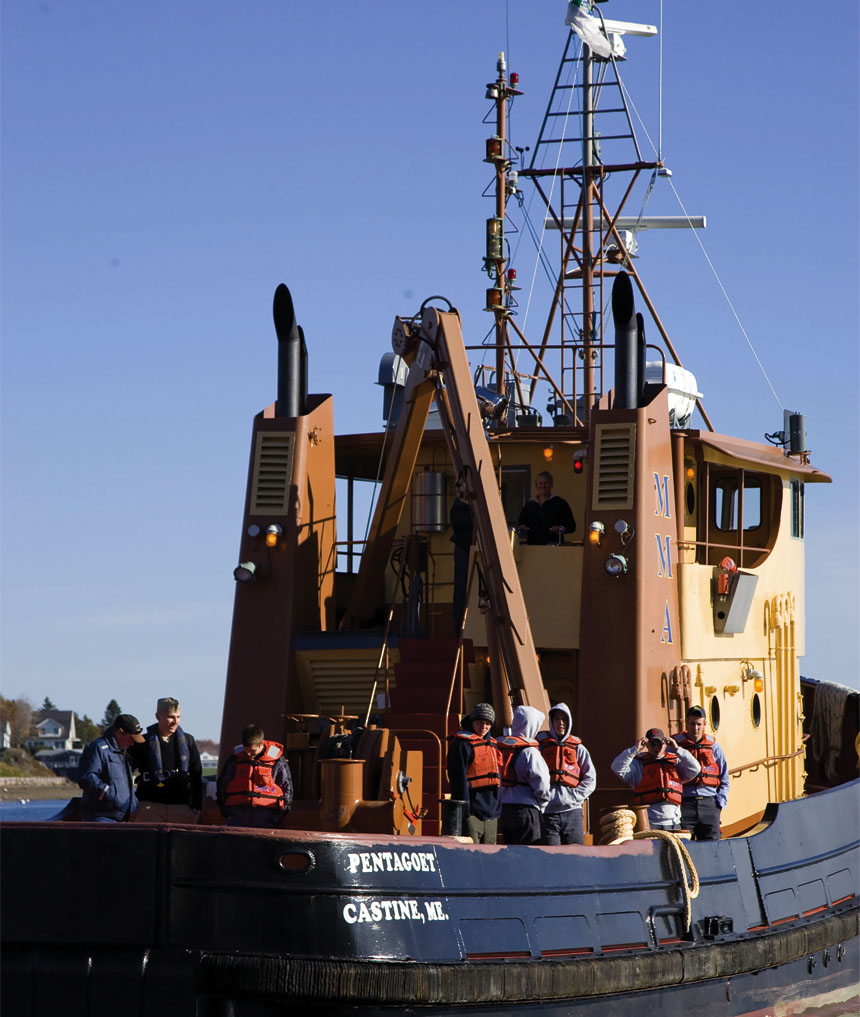
Students aboard the Pentagoet in 2008.
PHOTO BY SNAVELY
The first developer and instructor of the tug and barge course was Captain Herbert Walling ’71 & ’87. Walling worked at Getty Oil Tankers, Interstate Ocean Transport, SONAT Marine Company, and Maritrans Transportation, Inc. He returned to MMA to start the fledgling course and to acquire his master’s degree in maritime management. He was instrumental in accomplishing Rodgers’s goal to develop training for the tug and barge industry. Walling took Rodgers’s fresh approach to training and matched it with his own expertise, experience, and willingness to mentor students. With his gentle spirit and steady demeanor, Walling was the perfect person to develop the nation’s first tug and barge class.
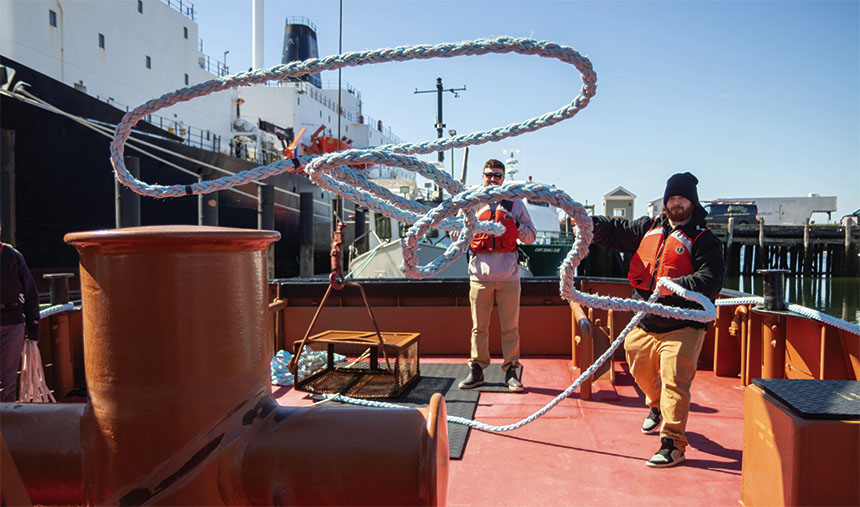
Practice throwing lines.
In the early days of the tug and barge class, practical skills in managing a tug underway were taught in four-hour labs aboard the Pentagoet. The tug was running and ready to go when students stepped aboard. Labs focused on basic deck and vessel handling skills.
Forty years later, the class work and ten-hour underway lab cover more material and focuses on workforce training. Students now lead the effort to bring the tug to life, lead the daily safety briefs, and oversee the safety management system. Students practice vessel-handling skills for three modes of towing: astern, alongside, and pushing ahead. They practice piloting exercises on the Penobscot River and operating an assist tug to dock and undock the tug and barge unit. While training aboard the Pentagoet, students rotate through positions: student engineer, deckhand, mate, and captain.
In the early days of the tug and barge class, practical skills in managing a tug underway were taught in four-hour labs aboard the Pentagoet.
Assignments align with the Tug Operator’s Assessment Record (TOAR). The TOAR is a mandatory Coast Guard endorsement requiring completion of over ninety competencies. MMA students begin working through the TOAR competencies with the goal of completing the TOAR during the fall semester of their senior year.
Since the first tug and barge operations course was offered, tug and barge companies have had waves of consolidation and new companies have formed. The towing industry has gone through continual change, including in their hiring practices. It used to be that a graduate of a maritime academy was rarely hired straight out of school as a mate for a tug and barge position. Most often they were hired to go aboard as deckhands or able-bodied sailors. The goal was for the new hire to gain experience on deck and acquire the local knowledge needed to move into the wheelhouse.
Today, MMA graduates are routinely hired directly into mate positions. Companies have adapted the workplace with mate training programs, improved technology, and better tug design. A unified desire to make the industry safer for its mariners, including the implementation of safety management systems, the Tug Operators Assessment Record and Subchapter M Inspection requirements, have forced steady change and improvement in company operations and hiring practices.
Maine Maritime Academy has adapted to industry changes by adding additional vessel operating courses into its curriculum. Courses in ship handling, marine systems, workboat operations, and tug and barge operations improve students’ leadership qualities, communication skills, operational skills, safety management, and risk assessment skills. The Marine Transportation program has increased opportunities for industry experience and broader mariner skills through these specialty courses. Partnerships with tug companies provide cadet shipping and cooperative education positions.
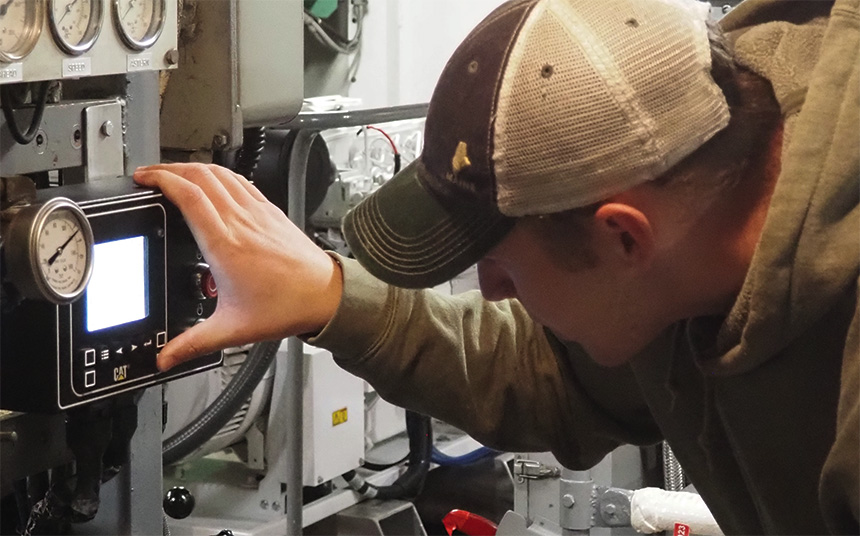
Student Brennan Huges-Shiverick prepares the main engines for start-up.
Classroom instruction has also evolved. In the early years of the tug and barge class, lectures covered tug and barge designs, different modes of towing, soft hawser vs. wire tows, coastal vs. ocean tows, and nomenclature. These traditional topics are still covered, but now students participate in research and lead discussions. In maritime studies, students discuss the influence of the International Marine Organization on domestic regulations, as well as the Towing Safety Advisory Committee and its purpose. They analyze incidents and accidents covered by the National Transportation Safety Board and assess how a good safety management system may have prevented the occurrence. Business topics include vetting (the process a company may use to see if your vessel is suitable for their cargo), internal vs. external audits, marine insurance, and inspections. Students learn about trade organizations, especially the American Waterways Operators (AWO), and their role in the towing industry. The instructor asks questions that require critical thinking during classroom sessions, and every student is expected to participate. This method broadens students’ view of the towing industry and provides them the opportunity to experience the towing industry as more than just the operation of the tug.
Students in the tug and barge program have great appreciation for the faculty and the curriculum. “I like being a jack-of-all-trades,” said Zach McKechnie ’23. “You get so much experience aboard the Pentagoet. You’re in the engine room, you’re doing your rounds while underway, you’re working with your other classmates. It’s really fun. And I like that our classes are small. We get a lot of one-on-one time with the instructors. It is really crazy the amount of stuff they’ve taught us in four years.”
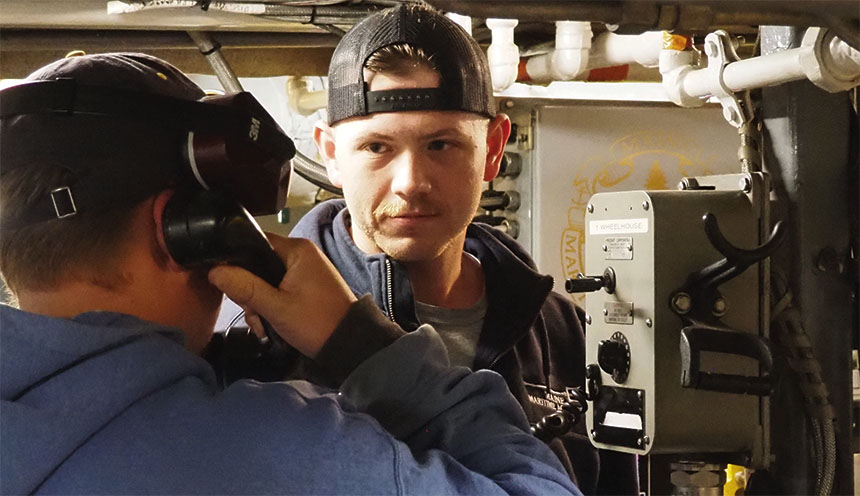
Zachary McCarthy tests the phones between the engine room and pilot house.
Russell Marinari ’23 agrees. “My goal is to get on a vessel where I have ship-handling responsibilities. Maybe I’ll be on a tug, or maybe on an Offshore Supply Vessel in the Gulf. But what I love about the program is that it’s not just about boats. Captain Leach does a really good job covering the maritime profession as a whole and covering maritime law and regulations. I like that aspect of it.”
Natasha Olearcek ’23 and Brigette Olearcek ’23 aspire to maritime careers in the tugboat and barge operations sector. They were quick to praise Capt. Leach as a teacher. “He set us up for success not only in our classroom studies, but also in the real world application of the nautical knowledge he shared.”
The program’s faculty are always seeking ways to improve and grow both the Workboat Operations and Tug and Barge Operations programs. Classes and labs are regularly reviewed to better meet the workforce training needs of the tug companies hiring MMA graduates. The faculty solicits input through an Industrial Advisory Committee and a strong relationship with the American Waterways Operators. AWO is the tugboat, towboat, and barge industry’s advocate, resource, and united voice for safe, sustainable, and efficient transportation on America’s waterways, oceans, and coasts. AWO members operate on the rivers, coasts, Great Lakes, and harbors of the United States.
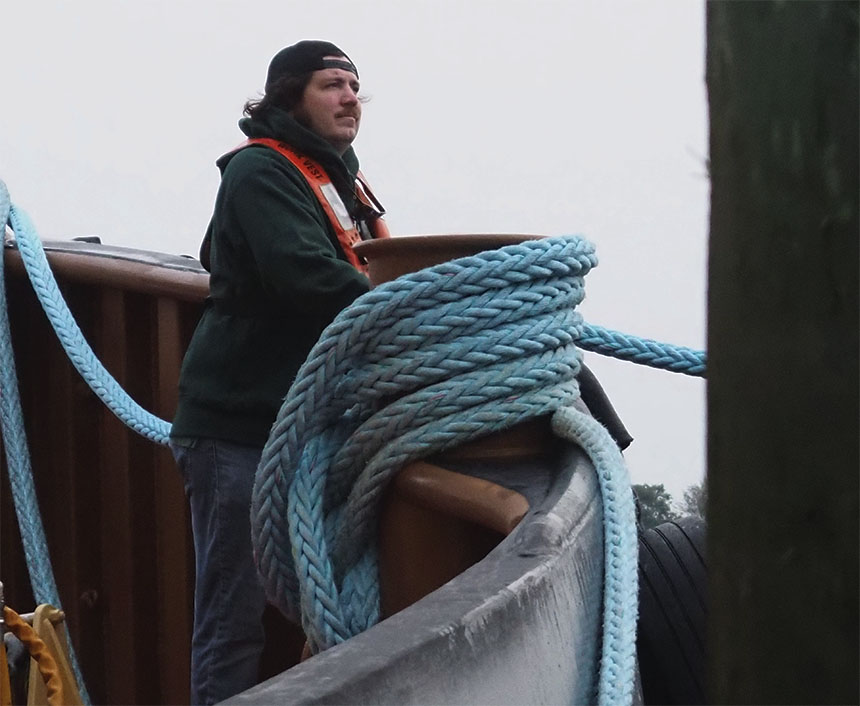
Zachary McKechnie prepares to take in the tug’s bow line.
Rodgers was a visionary leader who provided the necessary tools to set Maine Maritime Academy apart from the other maritime academies with its tug and barge workforce training. What he began forty years ago has grown, kept current with the industry, and sends out graduates fully capable of working on tugs and similar vessels with knowledge and care.█
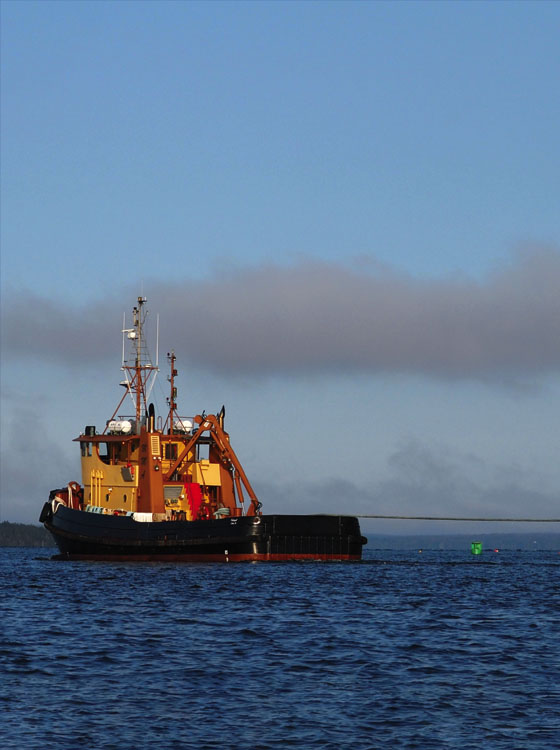
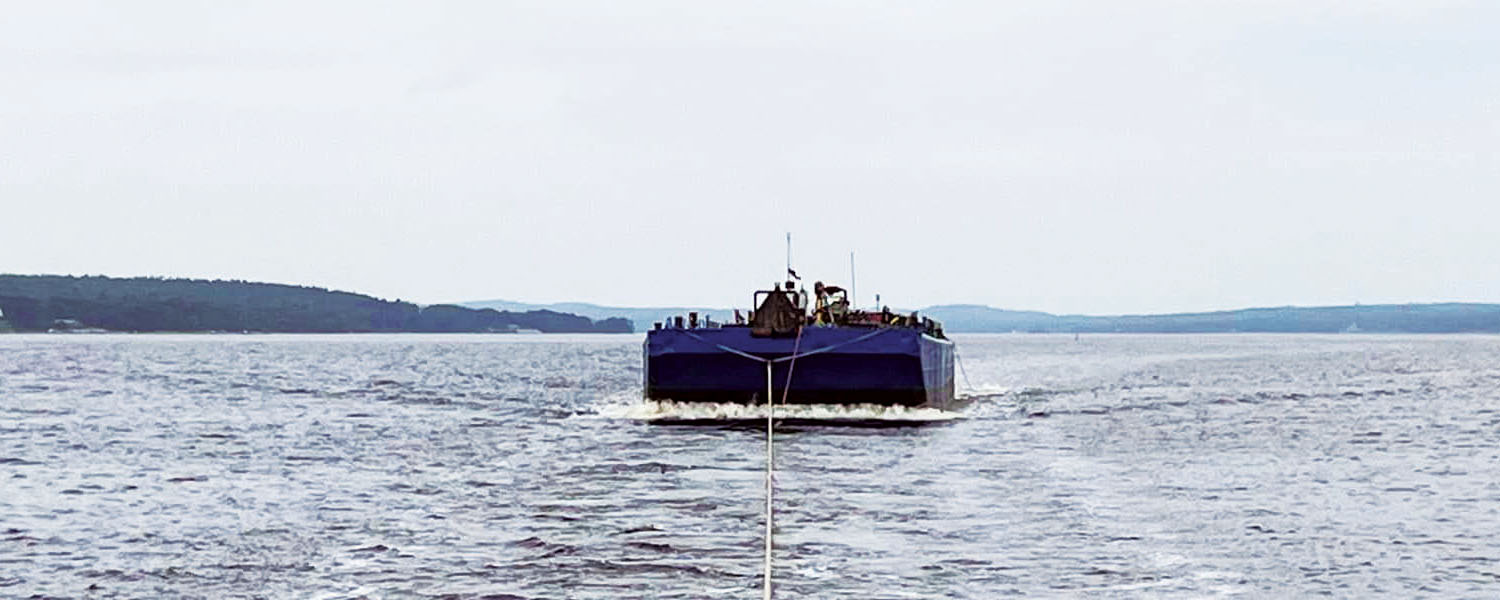



Post Comment
Comments are moderated and will be reviewed prior to posting online. Please be aware that when you submit a comment, you agree to the following rules:
Maine Maritime Academy reserves the right to delete any comment that does not comply with these guidelines and is not responsible or liable in any way for comments posted by its users. If you have a message for the editor, please email mariner@mma.edu.
Features
View All >Read More
Read More
Castine, Maine 04420All Rights Reserved © 2025
Privacy Policy & Terms
Web issue? Contact Webmaster